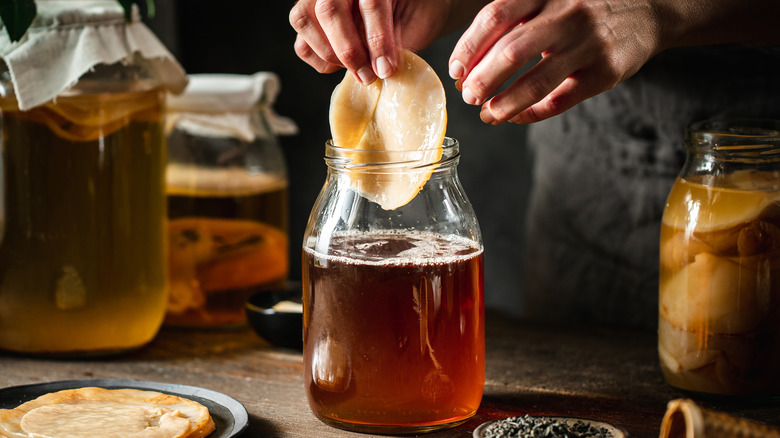The Gut-Friendly Beverage That Can Reduce Your Risk Of Cancer
Even though the fermented drink has existed for thousands of years since originating in China, kombucha became a novelty healthy elixir of sorts fairly recently around the rest of the world. From supermarket shelves that hold attractively packaged bottles to homemakers who sell organic varieties of the drink, you're probably able to get your hands on this fizzy and tart drink that's just shy of being sweet quite easily.
When it first became popular, kombucha was touted as being gut-friendly, mainly owing to the probiotics ("good" bacteria) the fermented drink contains. What starts off as black or green tea (which is what is typically used), sugar, yeast, and bacteria turns into a brown-hued liquid that contains vinegar, B-complex vitamins such as thiamin and niacin, amino acids, a small amount of caffeine (depending on the type of tea you use), phytochemical compounds, and trace levels of alcohol, after a fermentation process that can take anywhere from a few weeks to a month. The bacteria and yeast component in this beverage comes from something called SCOBY (symbiotic culture of bacteria and yeast). The thick and rubbery ingredient sits in the black tea and sugar during fermentation to feed on the caffeine and sugars and produce compounds that supposedly promote gut health. This is probably why fans of kombucha turn to the beverage in place of other supplements you can take for gut health.
As it turns out, kombucha may also help prevent cancer, owing to its rich antioxidant profile and tea polyphenols.
The kombucha and cancer prevention connection: Explained
Although studies done on this gut-friendly beverage are limited, a 2019 study published in the journal Microorganisms found that the antioxidants and phenolic content in kombucha protect against free radical damage. Meanwhile, the beverage also inhibits pathogenic bacteria in the gut, namely Escherichia coli. E. coli, Shigella dysenteriae, Salmonella Typhi, and Vibrio cholera. The fizzy drink has also been thought to exert toxicity on colorectal cancer cells.
Research seems to indicate that the polyphenols found in this beverage could block gene mutation and cancel cell growth, while also promoting cancer cell death (per Comprehensive Reviews in Food Science and Food Safety). A 2013 study published in Biomedicine and Preventive Nutrition found that kombucha significantly decreased the survival of prostate cancer cells by suppressing the expression of angiogenesis stimulators, possibly helping to reduce blood supply to cancer cells. The study points toward this beverage's potential to be a valuable tool for cancer treatment too, because of how your gut bacteria could restore your immune system.
According to a 2023 study published in Biochimica et Biophysica Acta (BBA) — Reviews on Cancer, gut-friendly fermented foods like kombucha could be beneficial in positively influencing gut microbiome diversity and reducing inflammation, two things that could help when it comes to immunotherapy and cancer treatment. However, more research is needed on kombucha's role in preventing and treating cancer.
Consuming kombucha: Things to consider
Kombucha is thought to be great for immune system health (owing to its polyphenol content, many acids such as acetic, glucuronic, and D-Saccharic acids, and B vitamins), liver health (because of its enzymes and acids), and even heart health. "Kombucha has been shown to limit the plaque that can build up in your arteries," shared registered dietitian Julia Zumpano (via the Cleveland Clinic).
Even so, experts warn that kombucha might not be for everyone and should be consumed in moderation. If you're immunocompromised, for instance, its live bacteria content can become problematic. If you have candida overgrowth, the sugar and bacteria in the beverage can make matters worse. People with digestive issues like irritable bowel syndrome (IBS) and inflammatory bowel disease (IBD) should also tread with caution. Even though kombucha supposedly contains "good" bacteria that can help your gut microbiome, if you're not sure about its origins, you could end up allowing pathogens into your system. For people with IBS, any added sugars could be potentially irritating. It also doesn't help that the beverage is carbonated.
Experts recommend against making kombucha at home unless you're well-versed in handling the fermenting process in a sanitary way so as to avoid bacteria or mold overgrowth. There is also the risk of lead toxicity from fermenting kombucha in ceramic or clay bowls. Lastly, while most people can handle a moderate amount of kombucha, too much could cause digestive issues and excess acid in one's system.



